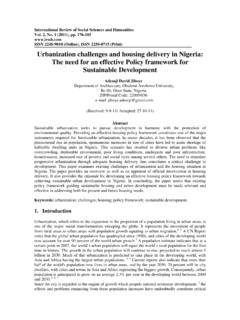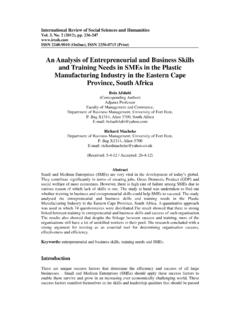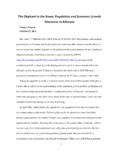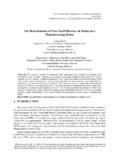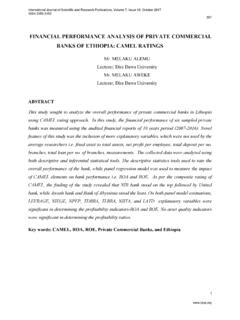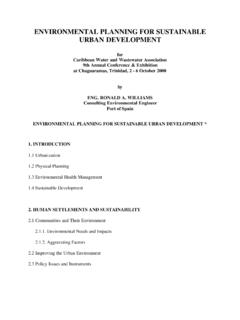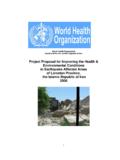Transcription of Globalization and the Industrial Development of …
1 International Review of Social Sciences and Humanities Vol. 6, No. 2 (2014), pp. 12-24 ISSN 2248-9010 (Online), ISSN 2250-0715 (Print) Globalization and the Industrial Development of Nigeria: Evidence from Time Series Analysis Friday Ebong (Corresponding Author) Department of Economics, University of Calabar PMB 1115, Calabar, Nigeria E-mail: Elijah Udoh Department of Economics, University of Calabar PMB 1115, Calabar, Nigeria E-mail: Frances Obafemi Department of Economics, University of Calabar PMB 1115, Calabar, Nigeria E-mail: (Received: 6-5-13 / Accepted: 1-8-13) Abstract Among the biggest dilemmas developing countries face is whether they should open their economies up to the Globalization process or adopt a cautious approach to avoid risks.
2 There are fears that Globalization would lead to environmentally damaging production and consumption patterns, high labour unemployment rates and such other fears as loss of local control over domestic economic programmes, as well as de- industrialization . In this paper, we examined the nature of the influence Globalization might have exerted on the Industrial Development of Nigeria over the past five decades (1960-2010). Based on the Engle-Granger two-step and Johansen Cointegration tests, the vector auto regressions technique was used within an error correction framework. Findings clearly showed that Globalization had significant impacts on Industrial Development in Nigeria.
3 Specifically, trade openness had a positive influence on Industrial Development . This suggested that increasing the level of trade with the rest of the world would create opportunities to export local raw materials and import necessary inputs into the Industrial process. In contrast, financial liberalization adversely impacted on Industrial Development . Policies were required to reverse the tide of capital flight from the country and direct resources towards developing the country s Industrial sector. Keywords: Globalization , Industrial Development , co-integration, vector auto regressions, error correction framework. International Review of Social Sciences and Humanities, Vol.
4 6, No. 2 (2014), 12-24 13 1. Introduction industrialization is regarded as a veritable channel of attaining the lofty and desirable national goals of improved quality of life for the citizenry. Governments, especially in developing countries, see industrialization as a way of transforming their economies (Ayodele and Falokun 2003). They seek to use industrialization as a weapon for increasing their national output, minimizing unevenness in Development outcomes, generating funds for the government, minimizing their dependency on the developed countries, and in some cases, minimizing fluctuations in foreign exchange earnings.
5 These and other objectives contain elements of conflict and the necessary trade off are not usually logically effected. While desiring to use industrialization to tackle Development generally, many governments have neglected the need to establish industries that are most suitable for their environment. For instance, many of the industries are not geared towards greater use of labour and other abundant local inputs. Thus industrialization has not assisted significantly in tackling the problem of domestic resource utilization. Yet these countries regard industrialization as a sine qua non for breaking the vicious cycle of poverty and for achieving dynamic and self-reliant economies.
6 In Nigeria, as in many other developing countries, the word industry is used essentially as a synonym for manufacturing. This is because manufacturing is the most dynamic component of the Industrial sector. industrialization has come to be regarded as a crucial and powerful engine in the overall Development process. The World Bank has classified Nigeria as inward oriented by trade orientation. Using data for 1963 73 and 1973 1985, she was deemed moderately inward oriented for the production period 1963 1973, but strongly inward oriented for the period 1973 1985. By any standard, Nigeria would be classified as industrially underdeveloped.
7 Yet a lot of efforts have been put into the industrialization process. Plan after plan, investment policies have been renewed, fine-tuned and at times completely revamped. Resources are abundant and investment opportunities are almost unlimited. Various Industrial Development policies, perspective plans and medium term economic plans acknowledged the importance of the manufacturing sector in the economy. For instance, as stated in the nation s 4th Plan, manufacturing is capable of sustaining a minimum growth rate of 15% per annum, contributing over 7% to gross domestic product, promoting employment and enhancing the value of natural resources, to mention but a few.
8 Although industrialization (with special emphasis on manufacturing) is vital in the process of economic Development , its performance in Nigeria has not been quite impressive. Two main strategies have been put in place to correct this anomaly. The first is the import substitution strategy while the second is the export promotion strategy. The second strategy, which has been in vogue since the adoption of the SAP in Nigeria in mid 1986, emphasizes the promotion of value added non-oil exports, especially manufactures, and di not actually achieved significant results (Uniamikogbo, 1996). Globalization is a process through which an increasing free flow of ideas, people, services, capital and culture should lead to the integration of national economies and societies across the globe.
9 It is a call on national economies all over the world to, as a matter of deliberate policy, be open to trade, international capital movements and labour mobility. According to its protagonists, Globalization is expected to boost the standard of living of the people in all participating countries through rising incomes and the transfer of sophisticated technology (as in information and biotech agriculture) from the developed to the developing economies; through promoting human freedom by spreading information that broadens their choice (Annan-Yao, 1996). Avenues to Globalization undoubtedly include international trade, capital flows, advances in telecommunication and transportation, etc.
10 Friday Ebong et al. 14 Some of the aspects of Globalization expected to guide fair competition include the anticipated reduction of barriers to free trade as a result of the World Trade Organization s (WTO) agreements and the growing global technology and improved work organizations. Nigeria is increasingly launching herself into the Globalization train, expecting to address her current economic problems of unemployment, prices instability, balance of payments disequilibrium, poverty, income inequality, among others. Privatization, deregulation of key sectors of the economy, financial and trade liberalization are means of adapting to Globalization in order to fit into the new global system.
